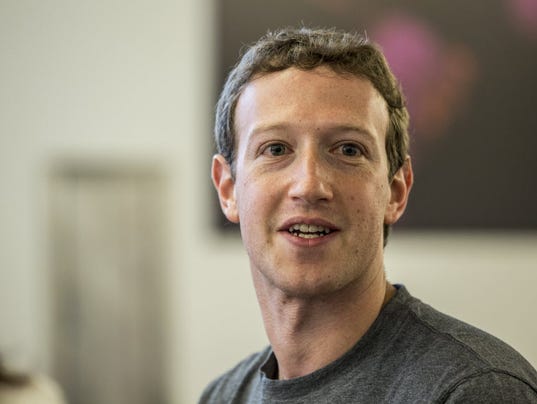
SAN FRANCISCO — In an earnings season in which other major tech companies could do very little right, Facebook could do no wrong.
The tech giant delivered relief to Wall Street in the midst of a dismal spate of tech earnings with yet another quarterly earnings beat, this one propelled by its robust mobile advertising business and growing momentum for video advertising.
Facebook seized the opportunity to announce a three-for-one stock split to create a new class of non-voting shares. The stock split is designed to keep Facebook CEO Mark Zuckerberg in control of the tech giant. With the split, Facebook shareholders would receive two non-voting shares for each single share they hold. Shareholders will vote on the proposal at the company's annual meeting on June 20.
Google parent Alphabet issued a special share class in 2014 to give company founders Larry Page and Sergey Brin more freedom to take risks on speculative technologies and new businesses.
Zuckerberg laid out his 10-year vision for Facebook at the company's annual developer conference earlier this month. Among his ambitions: to connect the rest of the world to the Internet, developing artificial intelligence that can automate communication and commerce and turn virtual reality into the next big social platform where friends and family can spend time together.
Zuckerberg and wife Priscilla Chan have also pledged to give away 99% of their Facebook shares to tackle some of the world's most complex problems over the couple's lifetime.
"I'll be able to keep founder control of Facebook so we can continue to build for the long term," Zuckerberg said. "I see more bold moves ahead of us than behind us."
Few investors will object to Zuckerberg's tight control of the company if he can keep delivering street-beating financial results. Facebook has topped estimates in all but one quarter since its initial public offering four years ago.
Shares (FB) soared 9% in extended trading. Facebook reported first-quarter financial results after the markets closed on Wednesday.
Earnings season has been anything but kind to the tech industry — Google, Microsoft, Apple and Twitter are among those whose quarterly results sorely disappointed investors. Coming off a record fourth quarter in which it posted revenue 9% higher than expected, Wall Street had hoped Facebook would be the exception, and it was.
Pivotal Research analyst Brian Wieser pronounced the quarterly performance "stellar."
"With many levers of growth yet to be pulled, we continue to see many reasons to remain highly optimistic in Facebook," said Wieser who raised his price target to $157 from $154.
Fueling the positive sentiment: Facebook's winning streak in mobile advertising and the rise of video advertising. Facebook has been showing its 1.65 billion users videos that play automatically and it has introduced more advertising on photo-sharing service Instagram. First-quarter results illustrated the traction Facebook is gaining with advertisers.
Facebook grew revenue 52% to $5.382 billion in the first quarter. Revenue was expected to be $5.25 billion, up from $3.5 billion a year ago. Eighty-two percent of advertising revenue in the first quarter came from mobile, up from 80% in the fourth quarter. Facebook is expected to account for about 12% of the $186.81 billion global digital advertising market in 2016, according to research firm eMarketer.
Pivotal Research estimates Facebook will capture 47% of global digital advertising growth and 43% of all advertising growth outside of China in 2016.
"And this is before several future engines of growth have begun to scale," including Instagram, messaging apps Messenger and WhatsApp and virtual reality player Oculus, Wieser said.
Profits also soared. Facebook reported earnings of 77 cents per share in the first quarter. Analysts expected Facebook to report earnings per share of 62 cents. Net income was $1.5 billion, up 26%.
Facebook continued to grow its user base. About 1.65 billion people checked Facebook at least once a month during the first quarter compared up from 1.59 billion in the fourth quarter. The average user now spends 50 minutes a day on Facebook, Instagram and Facebook Messenger, the company said.


